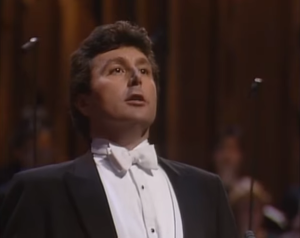Podcast: Play in new window | Download (Duration: 1:29:39 — 96.3MB) | Embed
Subscribe: Spotify | TuneIn | RSS | More
Jerry Hadley (16 June 1952 – 18 July 2007) is regarded by many as the most gifted American lyric tenor of the late 20th century. Last month he would have celebrated his 71st birthday. And today is the sixteenth anniversary of his untimely death. I knew Jerry well in the early 2000s when he was dating one of my best friends. Our friendship developed separately from that: in those years in which he was working at rebuilding his voice and career we worked together on a cross-section of his old and new repertoire. At the time of his death, he was no longer romantically involved with my friend, so he and I had drifted apart. Nevertheless, it hit me very, very hard, and I mourn his loss to this day. On that front, I have quite a few things to say about singers and mental illness, and the ruthlessness, implacability, and heartlessness of a profession which so often chews up the most vulnerable of us and spits them back out. When Jerry was at his best, his art sustained him, but the challenges ultimately became too much for him to face. But this episode is primarily a celebration: my primary objective is to present my friend at his exceptional best, in performances, both live and studio, which celebrate his voice, artistry, and spirit, performances which provided his public with some of the finest tenor singing they would ever hear, in that, or any other, era.
WARNING: THIS EPISODE CONTAINS A DISCUSSION OF SUICIDE AND SUICIDAL IDEATION.
Countermelody is a podcast devoted to the glory and the power of the human voice raised in song. Singer and vocal aficionado Daniel Gundlach explores great singers of the past and present focusing in particular on those who are less well-remembered today than they should be. Daniel’s lifetime in music as a professional countertenor, pianist, vocal coach, voice teacher, and journalist yields an exciting array of anecdotes, impressions, and “inside stories.” At Countermelody’s core is the celebration of great singers of all stripes, their instruments, and the connection they make to the words they sing. By clicking on the following link (https://linktr.ee/CountermelodyPodcast) you can find the dedicated Countermelody website which contains additional content including artist photos and episode setlists. The link will also take you to Countermelody’s Patreon page, where you can pledge your monthly support at whatever level you can afford. Bonus episodes available exclusively to Patreon supporters are currently available and further bonus content including interviews and livestreams is planned for the upcoming season.

